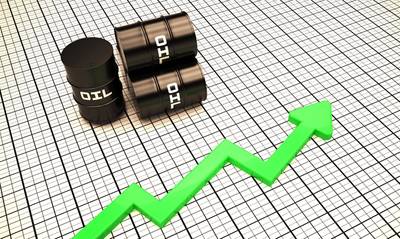Oil Soars 10%
Oil futures jumped 10% on Monday after an attack on Saudi Arabian crude oil processing facilities over the weekend sliced the kingdom's production in half and threatened to hamper shipments from the world's largest crude exporter.
Prices initially surged more than 20% after the open on Sunday evening, with Brent crude posting its biggest intraday gain since the 1990-1991 Gulf crisis, before pulling back as various nations have said they would tap emergency supplies to keep the world supplied with oil.
Brent crude futures rose as much as 19.5% to $71.95 per barrel, the biggest intraday jump since Jan. 14, 1991. By 10:37 a.m. EDT (1437 GMT), the international benchmark was up $6.4330, or 10.7%, at $66.67 a barrel.
U.S. West Texas Intermediate (WTI) futures climbed as much as 15.5% to $63.34, the biggest intraday percentage gain since June 22, 1998. WTI was last trading $5.61, or 10.2%, higher at $60.45 a barrel.
Volumes soared, with more than 750,000 U.S. futures contracts changing hands by 10:30 a.m. EDT, already surpassing average daily activity.
U.S. gasoline futures rose 9.7%, while U.S. heating oil futures gained 8.5%.
Saudi Arabia is the world's biggest oil exporter and, with its comparatively large spare capacity, has been the supplier of last resort for decades.
The attack on state-owned producer Saudi Aramco's crude-processing facilities at Abqaiq and Khurais cut output by 5.7 million barrels per day. The company has not given a timeline for the resumption of full output.
Two sources briefed on Aramco's operations said a full return to normal production "may take months."
“We are seeing oil loadings out of Saudi resume and are increasing to handle the shortfall over the weekend. The question is for how long Saudi Arabia can maintain export levels and quality while the damage is fixed," Geoffrey Smith, director of oil & shipping research at Refinitiv, said in a note.
President Donald Trump approved the release of oil from the U.S. Strategic Petroleum Reserve.
Trump also said he was ready to respond to the strike, and the threat of retaliation and an escalation of tensions in the Middle East may keep prices elevated, regardless of any relief from global stockpiles.
"This justifies a risk premium on the oil price, so prices are initially unlikely to return to the levels at which they were trading before the attacks," said Carsten Fritsch, oil analyst at Commerzbank in Frankfurt, Germany.
U.S. Ambassador to the United Nations Kelly Craft told the Security Council that emerging information on attacks on the Saudi oil facilities "indicates that responsibility lies with Iran" and that there is no evidence the attack came from Yemen.
Britain's U.N. Ambassador Karen Pierce told the 15-council: "We're still assessing what happened and who's responsible for the attacks. Once this has been established we will discuss with our partners how to proceed in a responsible manner."
Russia and China urged against hasty conclusions over the attacks.
Asia exposed, products in demand
Saudi oil exports will continue as normal this week as the kingdom taps into stocks from its large storage facilities, an industry source briefed on the developments told Reuters.
"One of the very few countries with spare oil capacity is Saudi Arabia ... It was exactly this extra supply cushion that has been wiped out over the weekend albeit possibly only for a limited period of time," Tamas Varga of oil brokerage PVM said.
Major importers of Saudi crude, such as India, China, Japan and South Korea, will be the most vulnerable to any supply disruption. South Korea has already said it would consider releasing oil from its strategic reserves.
Saudi Arabia is set to become a significant buyer of refined products after the attacks, which may have also cut Saudi Aramco's refining capacity, consultancy Energy Aspects said.
Aramco Trading Co is making enquiries to buy diesel for prompt delivery, trade sources said.
(Additional reporting by Koustav Samanta, Sabina Zawadzki and Dmitry Zhdannikov, Devika Krishna Kumar; Editing by Dale Hudson and Marguerita Choy)

